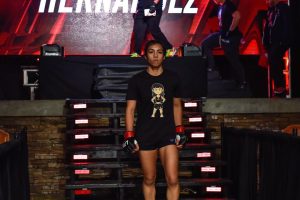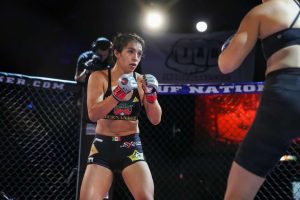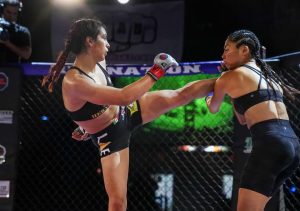- Slug: Sports – Athlete Injuries Mental Health, 1,500 words.
- 3 photos available (thumbnails, captions below).
By Taylyn Hadley
Cronkite News
PHOENIX – After spending 18 injury-free years in combat sports, Leslie Hernandez’s streak of luck came to an end after suffering a torn labrum earlier this year.
While the injury took a physical toll, its impact extended beyond her body. For the 25-year-old fighter from Phoenix and athletes of all levels, the impact of a sports injury not only results in physical ability being compromised. Part of their identity is also fractured. Physical therapy and body rehabilitation often overshadow the mental toll required for a full recovery and a successful return to activity.
Hernandez, who is in pursuit of a full-time UFC contract, has dealt with anxiety, depression and guilt this year in efforts to return to the octagon. In addition to the physical and emotional strains, she started a GoFundMe account in February to raise $10,000 for shoulder surgery to ease the financial burden of not qualifying for medical insurance.
“I was really scared to get started (with the road to recovery),” Hernandez said. “I might be out for a long time. What if that beats me?”
Seemingly isolating feelings at the time for Hernandez, they turned out to be universal among injured athletes who experience the same phenomena.
Mental challenges vs. athletic ambitions
In recent years, college and professional athletes, from swimmer Michael Phelps to quarterback Dak Prescott, have come forward to discuss struggles with their mental health. While expectations and pressure often play a role, so do injuries. Former ASU wrestler Ryan Millhof has said countless injuries contributed to his attempt to take his life in 2019.
Asking for help is another matter. A 2022 study conducted by the NCAA found that less than half of women’s sports and men’s sports participants said that they would agree or strongly agree to a question about seeking help from a mental health provider on campus.
Hernandez started her athletic pursuits in boxing and taekwondo. In 2019, she fully dedicated her training to mixed martial arts in an attempt to build her resume and earn a contract with the UFC. During her short amateur stint, she went 3-0 with two wins by unanimous decision and one by TKO.
Hernandez and her team recognized she held a more professional style of combat that would help in catapulting her to professional success. To take the next step, she signed with Legacy Fighting Alliance (LFA) to find and schedule opponents and help in promotions.
LFA, a popularly known UFC building block for fighters that televises events on UFC Fight Pass, scheduled Hernandez’s first match in May 2022. She lost her debut via split decision but earned a first-round TKO win in her second bout.
Although coming off of an impressive 47-second win in the ring, Hernandez’s mind and heart were not fully in it.
“Around November, I was going through a very hard time in my life and I was just doubting myself,” Hernandez said. “Just going through what athletes go through sometimes … a lot of mental health problems and stuff.”
An athlete’s day-to-day requirements are often at the expense of personal care and time. More time spent in the gym limits time outside of it. On the positive side, injury comes with the opportunity to take a step back and get a long overdue break.
That was the case for Hernandez, who lost her brother to cancer in 2021 and admits that she never fully grieved the loss while masking it by piling on to her training schedule.
“I fought and I trained just to try to forget about that … but I couldn’t recover from it,” Hernandez said. “The whole year of 2022 was probably one of the hardest years I had.”
The expectation to keep training and performing through tragedy is familiar among athletes. Rain or shine – tragedy or triumph – they are perceived as immortal until reality hits.
“Athletes are humans first,” said Maddie McLean, a licensed counselor who specializes in sports performance, coping skills and life transition. “They are not just robot performance machines, they are human beings, they’re going to have (injuries) … they’re going to have very tough days.”
Navigating the challenges
Hernandez’s struggles in 2022 would not improve entering 2023. After initially injuring her shoulder nearly a year and a half earlier, Hernandez received an MRI that confirmed her torn labrum – an injury that required surgery if she wanted to fight again.
One final round of sparring forced Hernandes to succumb and face the music – she was going to have to take some time off with only two centimeters of connected tissue left in her shoulder.
“When all that happened, man, it was so hard,” Hernandez said. “I didn’t want to get the surgery, I (didn’t) want to be out for that long.”
Elisabeth Kubler Ross’s five stages of grief are often referenced by sports psychologists when caring for injured athletes who are processing their new reality. The first stage is denial, which Hernandez experienced, followed by anger, bargaining, depression and acceptance in the model designed for people dealing with loss.
“It’s just like everyday life,” said John Gassaway, a Doctor of Psychology who specializes in performance enhancement. “So if we lose something that we love, whether that’s a function, whether it’s a possession, whether it’s a family member – losing that, you go through the grief stages, so the functionality of it is something that you were accustomed to doing.”
The tipping point of Hernandez’s injury and the uncertainty of her future led to depression and anxiety. She felt a loss of her identity due to a lack of structure that had been a part of her life since she was 7. Suddenly, her passional was taken away.
Hernandez’s experience with competing through an injury is not uncommon. Many athletes hold the fear of losing a starting spot or a contract above taking care of their injury. This is often a contributing factor to why athletes stay in the game and risk further damage that extends their recovery or, in the worst case, ends their career.
Hernandez was not only worried about losing her opportunities due to being sidelined for an extended period of time but also about her love of the sport.
“My biggest fear was, ‘What if (while) being out, what if I lose motivation? What if I lose the love for fighting?’” Hernandez said.
However, the opposite feelings surfaced during her recovery time. Along with sadness came a sense of relief and reflection. With her body and mind temporarily on pause, she had the chance to address these emotional burdens. Hernandez’s time away from fighting allowed her new opportunities to take care of her mental health and finally grieve the loss of her brother.
“The first three months I couldn’t do anything. My body took a break (and) my mental took a break,” Hernandez said. “I was able to see everything from the outside … I got more motivated, just (seeing) stuff (from) the outside.”
Hernandez’s feelings come from a lesser talked about phenomenon during injury and recovery that unlocks guilt due to feelings of relief from being allowed a break in sport. Exhaustion, busy schedules and time away from friends and family are all aspects that come with being an elite athlete.
“(High-level athletes) feel a little bit ashamed or embarrassed about feeling a little bit relieved,” said Erin Trujillo, a licensed professional counselor at ASU who specializes in athlete mental health. “So maybe they miss the sport a little bit, but they’re a little bit relieved that they have a little bit of time and that’s complicated, and both of those exist.”
Journey of recovery and discovery
A good support system, space to openly speak about mental struggles and staying active to avoid feelings of isolation are important steps to help mental health woes when succumbing to injury.
Hernandez credits her family, friends, teammates and coaches for keeping her motivated during her recovery. Wearing a sling, she never left the gym and often showed up to watch her teammates train and stay involved.
“(When injured) all of a sudden an athlete is cut off from their everyday routine, their everyday support system that they may have around them – especially (their) team,” McLean said. “It’s the easiest thing in the world to feel incredibly isolated from your support system.”
Hernandez also credits her ability to sit and watch from the sideline in reigniting her love for the sport of MMA and gaining a greater appreciation for the privilege to compete professionally.
“It made me miss the sport a lot more,” Hernandez said. “I’m back (to the point) where I’m like, ‘Oh I love this, I really do love this.’ I cannot be without fighting.”
Now, almost at the end of her recovery journey, Hernandez has brighter and bigger eyes than ever. Already training at 95% capacity, Hernandez should be cleared to compete soon and already has her eyes set on a November return to combat with a refreshed mind, body and fighting spirit.
“My recovery has been great, physically and mentally,” Hernandez said. “I feel like a brand new person, fresh (and) ready to go.”
For more stories from Cronkite News, visit cronkitenews.azpbs.org.


